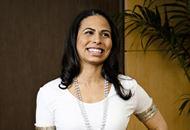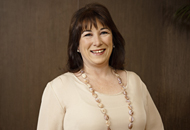The Ultimate O Interview: Oprah Answers All Your Questions
PAGE 2
Kelli: But the world is always watching and judging you. How has the public scrutiny you've had to endure affected your life?
Oprah: Years ago, it made me cry a lot because I'm such a pleaser. I would say that's my single greatest character flaw: the importance I put on wanting to be liked. That comes from having been abused as a child—being beaten and not even being able to be angry or to have any emotions about it. I was trained to believe that other people's feelings were more important than my own, and that only through pleasing somebody could I be loved. It has taken me 56 years to overcome that. And by the way, in all those 56 years I have never once called my parents to share anything with them. Not "I got a job," "I met a guy," "I made a million dollars"—not once, ever. I'm in awe of people who felt their parents' love every day of their lives. They start out in the world with a full cup. The rest of us go through life trying to fill ours.
 Keisha Sutton-James: Have you reconsidered writing an autobiography?
Keisha Sutton-James: Have you reconsidered writing an autobiography?
Oprah: It just so happens that there's a new biography, which I did not approve, and I hear that 850 people were interviewed for it. I don't know 850 people! My circle is tight, tight, tight. If there are 850 people talking about you, it can't all be good. But to answer your question, yes, I did consider writing my own story, back in 1993. At the time, I had a lawyer-agent-manager who said, "You know, you're turning 40 next year—I think you should do an autobiography." I said, "Really. Forty—okay." Because, you know, 40 used to be a big deal. Now it's 50 is the new 40 and 40 is the new 30, but back then... Anyway, I got led into doing this book. And I worked on it for a year, and then when it came time to release it, I didn't want to. I brought my little cabinet together—Stedman, Gayle, a couple of other friends—and Stedman was really opposed to it, though not because of anything I was saying about him. He thought I shouldn't speak of my family as candidly as I did. He also kept saying, "It's not going to help anybody just to tell the story." He thought the story of my life should be an example to other people, rather than just "I did this, I did this, I did this." I listened to that. I was in the middle of a huge learning curve at that time. I was learning that your life really just begins at 40. You shouldn't be trying to write your life story then! But calling the publisher to say I wasn't going to do the book was the hardest thing I'd ever done. They'd had a big Oprah-is-going-to-write-a-book party, and all I could remember was the shrimp they'd served—how big those shrimp were. I was thinking, "Oh my God, they must have spent so much money on those shrimp!"
Several years ago, Nelson Mandela told me I should do my autobiography, just for the record. I don't feel compelled to do that. And I don't know how I could write it all down. Or what I would write. I remember when I opened my school, I said to Maya Angelou, who is like a mother to me, "This will be my legacy—this school." And Maya, in her Maya-like way, said, "You have no idea what your legacy will be."
 Michelle Hankey: I've heard you say that you thought you'd grow up to be a teacher. Is that why you set up the school in South Africa—because school was so important to you?
Michelle Hankey: I've heard you say that you thought you'd grow up to be a teacher. Is that why you set up the school in South Africa—because school was so important to you?
Oprah: I started the school because I'd been searching for how I could best be used. My hope for the show and the magazine has always been that they will have meaning, that they will be worthy of people's time. In the elevator before I go out to do a show, my prayer is that I am used for something greater than myself. That it's not just chatter. I don't get up every morning to come here and just have a little chatty talk. I have always been searching for how I can best be used. And education was my solace growing up. It was my bright and shining moment, my savior. I wanted to give that to other girls. I wanted to do for the girls in South Africa what my teachers had done for me. I wanted them to be able to go to school for free and thrive there.
Oprah talks about how she avoids becoming cynical
Oprah: Years ago, it made me cry a lot because I'm such a pleaser. I would say that's my single greatest character flaw: the importance I put on wanting to be liked. That comes from having been abused as a child—being beaten and not even being able to be angry or to have any emotions about it. I was trained to believe that other people's feelings were more important than my own, and that only through pleasing somebody could I be loved. It has taken me 56 years to overcome that. And by the way, in all those 56 years I have never once called my parents to share anything with them. Not "I got a job," "I met a guy," "I made a million dollars"—not once, ever. I'm in awe of people who felt their parents' love every day of their lives. They start out in the world with a full cup. The rest of us go through life trying to fill ours.
 Keisha Sutton-James: Have you reconsidered writing an autobiography?
Keisha Sutton-James: Have you reconsidered writing an autobiography? Oprah: It just so happens that there's a new biography, which I did not approve, and I hear that 850 people were interviewed for it. I don't know 850 people! My circle is tight, tight, tight. If there are 850 people talking about you, it can't all be good. But to answer your question, yes, I did consider writing my own story, back in 1993. At the time, I had a lawyer-agent-manager who said, "You know, you're turning 40 next year—I think you should do an autobiography." I said, "Really. Forty—okay." Because, you know, 40 used to be a big deal. Now it's 50 is the new 40 and 40 is the new 30, but back then... Anyway, I got led into doing this book. And I worked on it for a year, and then when it came time to release it, I didn't want to. I brought my little cabinet together—Stedman, Gayle, a couple of other friends—and Stedman was really opposed to it, though not because of anything I was saying about him. He thought I shouldn't speak of my family as candidly as I did. He also kept saying, "It's not going to help anybody just to tell the story." He thought the story of my life should be an example to other people, rather than just "I did this, I did this, I did this." I listened to that. I was in the middle of a huge learning curve at that time. I was learning that your life really just begins at 40. You shouldn't be trying to write your life story then! But calling the publisher to say I wasn't going to do the book was the hardest thing I'd ever done. They'd had a big Oprah-is-going-to-write-a-book party, and all I could remember was the shrimp they'd served—how big those shrimp were. I was thinking, "Oh my God, they must have spent so much money on those shrimp!"
Several years ago, Nelson Mandela told me I should do my autobiography, just for the record. I don't feel compelled to do that. And I don't know how I could write it all down. Or what I would write. I remember when I opened my school, I said to Maya Angelou, who is like a mother to me, "This will be my legacy—this school." And Maya, in her Maya-like way, said, "You have no idea what your legacy will be."
 Michelle Hankey: I've heard you say that you thought you'd grow up to be a teacher. Is that why you set up the school in South Africa—because school was so important to you?
Michelle Hankey: I've heard you say that you thought you'd grow up to be a teacher. Is that why you set up the school in South Africa—because school was so important to you? Oprah: I started the school because I'd been searching for how I could best be used. My hope for the show and the magazine has always been that they will have meaning, that they will be worthy of people's time. In the elevator before I go out to do a show, my prayer is that I am used for something greater than myself. That it's not just chatter. I don't get up every morning to come here and just have a little chatty talk. I have always been searching for how I can best be used. And education was my solace growing up. It was my bright and shining moment, my savior. I wanted to give that to other girls. I wanted to do for the girls in South Africa what my teachers had done for me. I wanted them to be able to go to school for free and thrive there.
Oprah talks about how she avoids becoming cynical



